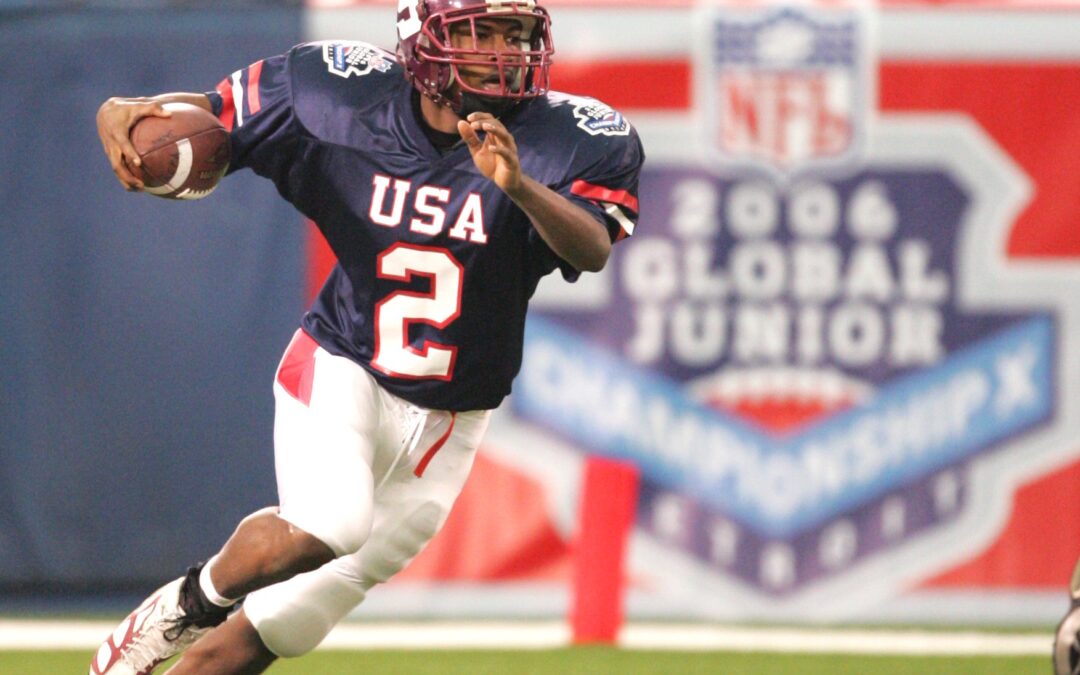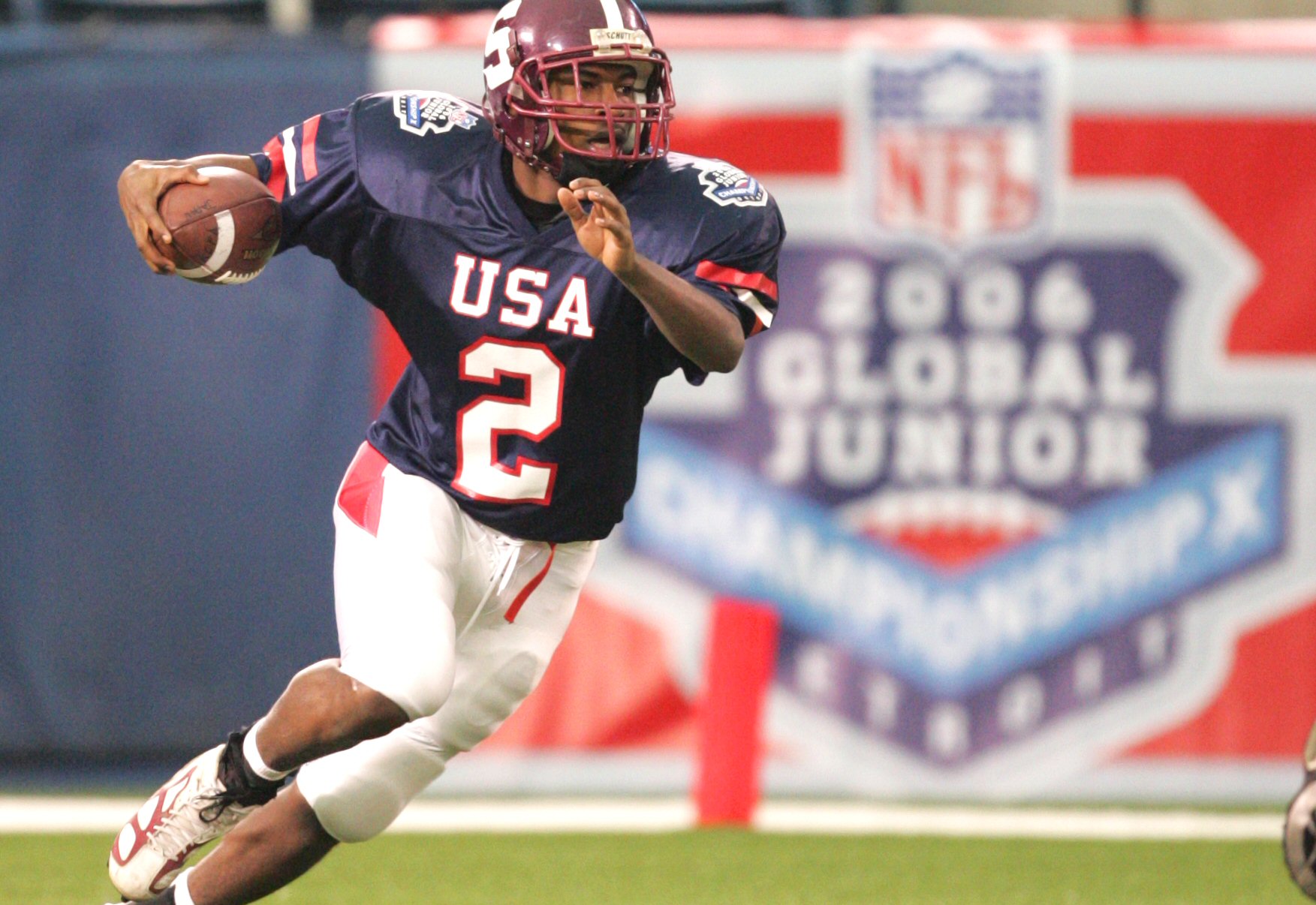 For eleven memorable years, from 1997 to 2007, the Global Junior Championship stood out among the highlights of the annual Super Bowl week of events.
For eleven memorable years, from 1997 to 2007, the Global Junior Championship stood out among the highlights of the annual Super Bowl week of events.
From humble beginnings aimed at showcasing the developing American football talent in Europe and Mexico to becoming a six-team tournament supported by the National Football League, the history of Global Football’s international tournament creation is littered with an array of the sport’s star names.
The NFL Global Junior Championship evolved from being a single game first played in 1997 to welcome teams from multiple nations and three continents. Along the way, Pro Football Hall of Fame stars endorsed the event, which provided a platform to launch future NFL, College Football and NFL Europe careers. Here are just a few names of those international standouts, who represented their respective nations in the GJC.
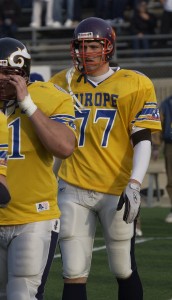 • German offensive lineman Sebastian Vollmer (pictured right) is a regular starter for the New England Patriots, having been scouted by the University of Houston while playing for Team Europe in the GJC in San Diego in 2003.
• German offensive lineman Sebastian Vollmer (pictured right) is a regular starter for the New England Patriots, having been scouted by the University of Houston while playing for Team Europe in the GJC in San Diego in 2003.
• Panama offensive lineman Frank Davis started three games for the Detroit Lions in 2006 as an undrafted free agent following a successful career at the University of South Florida and represented Panama in the GJC in 2000.
• German defensive end Constantin Ritzmann spent time on the practice squads of the Buffalo Bills and Atlanta Falcons, was team captain and starter at Tennessee. He was a three-time MVP of the GJC from 1997 to 1999 for Team Europe.
• English wide receiver Marvin Allen won a Super Bowl ring as a member of the Pittsburgh Steelers practice squad and played three successful seasons in NFL Europe. He played on multiple Team Europe squads.
Several Team USA quarterbacks have excelled within the college ranks, the most notable being Riley Skinner (Jacksonville 2005), who in 2006 led Wake Forest to the Orange Bowl and an 11-3 record as a freshman. Brian Johnson (Houston 2004 / Utah), Richard Kovalcheck (San Diego 2003 / Arizona and Vanderbilt), and Jay Davis (Tampa Bay 2001 / NC State) are all graduates of the GJC.
More than 40 Canadians have also progressed to both college football and the CFL, including wide receiver WR Kevin Challenger (Boston College), OL David Bouchard (Syracuse), DB Etienne Boulay (UNH/Montreal Alouettes), and Jean-Philippe Abraham (Edmonton Eskimos).
Some of the biggest names in football have supported the event as either honorary chairmen or banquet speakers, including celebrated college football coach Nick Saban, former NFL coach Dan Reeves, NFL Defensive MVP Jason Taylor, quarterback Jake Delhomme, fullback Mike Alstott, legendary broadcaster and coach John Madden and Super Bowl winner Emmitt Smith.
Nobody dared dream that such stars would have come out for the Global Junior Championship back in 1996 when Global Football President Patrick Steenberge first suggested the concept to the NFL.
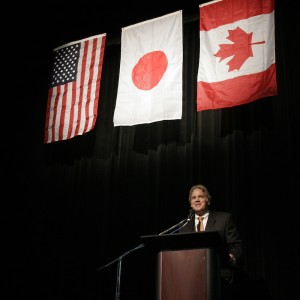 “I met with Pete Abitante and Gord Smeaton at the NFL, suggesting that we could showcase the best players from Europe and Mexico each year at the Super Bowl,” explains Steenberge. “The first thing I was told was that they wouldn’t give me any money, but they would watch with interest.
“I met with Pete Abitante and Gord Smeaton at the NFL, suggesting that we could showcase the best players from Europe and Mexico each year at the Super Bowl,” explains Steenberge. “The first thing I was told was that they wouldn’t give me any money, but they would watch with interest.
“So we had permission to host the Global Junior Championship at Super Bowl and were recognized as an official event by the host committee, which was a promising start. I had Tony Allen put together the Team Europe roster and Diego Miravete led Team Mexico and by January of 1997 at the Super Bowl in New Orleans, we had a game. That week also was when the NFL created their International Division which manages the global development of the sport.”
A quick and well-disciplined team of college freshmen and high school seniors representing Mexico proved too strong for a young European team and triumphed 30-6 in that first historic meeting. Dallas Cowboys President and General Manager Tex Schramm lent his support to the event as the first Honorary Chairman, paving the way for a string of illustrious names to endorse the event.
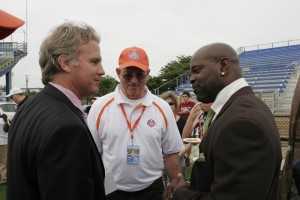 1997 Tex Schramm, President, Dallas Cowboys
1997 Tex Schramm, President, Dallas Cowboys
1998 Darren Bennett, Punter, San Diego Chargers
1999 Dwight Stephenson, Center, Miami Dolphins
2000 Dan Reeves, Head Coach, Atlanta Falcons
2001 Hassan Jones, Wide Receiver, Minnesota Vikings
2002 La’Roi Glover, Defensive Tackle New Orleans Saints &
Jake Delmomme, Quarterback, New Orleans Saints
2003 Darren Bennett, Punter, San Diego Chargers
2004 Elvin Bethea, Hall of Fame Defensive End
2005 LeRoy Butler, Safety, Green Bay Packers
2006 Herman Moore, Wide Receiver, Detroit Lions
2007 Jason Taylor, Defensive End, Miami Dolphins & Emmitt Smith, Running Back, Dallas Cowboys
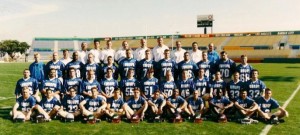 A year later in San Diego in 1998 in front of 9,000 fans, a 50-yard Europe field goal attempt fell short and Mexico was again victorious by a 13-12 margin. Renowned Coach Ed Burke hosted the Mexican players at his Torrey Pines High School then he would later serve as Team USA Head Coach in 2003.
A year later in San Diego in 1998 in front of 9,000 fans, a 50-yard Europe field goal attempt fell short and Mexico was again victorious by a 13-12 margin. Renowned Coach Ed Burke hosted the Mexican players at his Torrey Pines High School then he would later serve as Team USA Head Coach in 2003.
Team Europe (pictured) won the championship at the third attempt at Lockhart Stadium in Fort Lauderdale prior to Super Bowl XXXIII in 1999. Europe eliminated Mexico’s ability to make the big play and roared to a 29-8 win. German Constantin Ritzmann starred in the same week that same week he signed a national letter of intent with defending national college champion Tennessee.
“The beauty of the Global Junior Championship was that it gave kids like Ritzmann a chance to showcase themselves in front of high schools and college coaches,” added Steenberge. “That was the most important thing. We had some great players come through the event and of course Sebastian Vollmer is now a regular starter in the NFL.”
In Atlanta in 2000 an expanded four-team tournament saw Europe beat Panama 20-0 in the semi finals, while Canada edged hosts USA 9-3. In a Championship Game played in below freezing temperatures fans lit fires on the sidelines to fend off the cold as Canada secured a slim 7-6 victory. In the bronze medal game USA romped to a 38-0 win. Many Super Bowl activities fell victim to the ice storm, but not Global Football’s showpiece event.
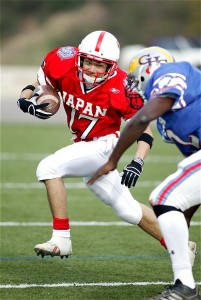 Tampa Bay, Florida, provided a significantly warmer setting for the 2001 Global Junior Championship V. The host USA team took advantage of early mistakes by Europe and stormed to a 49-5 semi final victory. Waiting for them to set up an all-North America final was Canada, 27-8 victors over Japan.
Tampa Bay, Florida, provided a significantly warmer setting for the 2001 Global Junior Championship V. The host USA team took advantage of early mistakes by Europe and stormed to a 49-5 semi final victory. Waiting for them to set up an all-North America final was Canada, 27-8 victors over Japan.
The bronze medal went to the speedy Japanese whose three interceptions including one returned 85 yards for a touchdown defeated Europe 14-7. In the final and trailing 21-19, the Canadians tried to snatch victory at the end. Only a sack and finally an interception with 24 seconds remaining kept the USA defense on top to ensure a host nation triumphed for the first time.
In 2002, the NFL officially supported and sanctioned the event, which became the ‘NFL Global Junior Championship’ as the USA swept aside Europe 39-6 in the semi final with all stars from the greater New Orleans area high schools making their mark. Canada was determined to avenge its narrow loss of a year earlier and breezed into the final with a 54-12 destruction of Japan.
Europe claimed the bronze medal, winning 27-16 against Japan, while the Championship Game was again a close contest. With defenses on top the USA led 16-8 until Canada’s Mike Faulds threw a Hail Mary touchdown as time expired to pull within two points. The two-point conversion attempt sailed agonizingly through the hands of a wide receiver and USA held on for victory.
The Team USA roster that represented the New Orleans area featured four players who went on to Louisiana State University to play for banquet speaker Nick Saban, in defensive backs Vernon Russell and Troy Hankton, offensive lineman Garrett Wibel and running back Jason Spadoni.
In San Diego in 2003 a record five teams competed as Mexico made a welcome return and outlasted Europe and beat Japan to finish third overall. Following a jamboree shootout round, Europe shut out Japan in the medal rounds to claim fourth place and place their opponents fifth.
The Championship Game proved to be another thrilling encounter between USA and Canada. USA recovered from a 21-7 deficit in a dramatic fourth quarter to force overtime. Arizona-bound quarterback Richard Kovalcheck underlined his credentials and broke Canadian hearts with a second touchdown pass to Johnny Principato, who had also caught the game-tying score.
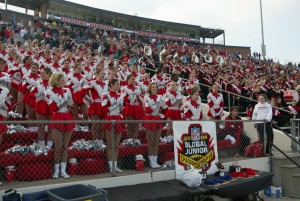 Texas state champion head coach Mike Johnston of Katy High School took charge of Team USA in 2004. Although the Houston-Harris County all stars lost to Canada in the first round stages, they recovered to retain the NFL GJC crown with a 31-point shutout of their rivals from north of the border in the Championship Game.
Texas state champion head coach Mike Johnston of Katy High School took charge of Team USA in 2004. Although the Houston-Harris County all stars lost to Canada in the first round stages, they recovered to retain the NFL GJC crown with a 31-point shutout of their rivals from north of the border in the Championship Game.
Mexico claimed third place from a spirited Japanese team, while the tournament welcomed a new competitor in Russia, as the European Junior champions replaced the Team Europe all-stars.
The 2005 tournament in Jacksonville, Florida, saw Canada finally overcome USA in a thrilling championship game, outlasting the home team 38-35 at a packed Bolles School Stadium. Canada had also triumphed over the USA in the round robin stage and celebrated head coach Danny Maciocia’s appointment as the new head coach of the Edmonton Eskimos of the CFL.
Canada saw leads of 14-0 and 31-14 chipped away before a touchdown by MVP Jerome Messam, who rushed for an incredible 308 yards, sealed a close victory. Mexico claimed third place for the third year running with a 42-point shutout of European Champion France and a 21-14 victory over Japan. The spirited Japanese team took fourth spot by beating France 21-13.
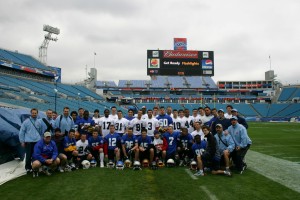 “Away from the action, one of the highlights of that event was the players from the French team holding their final practice in the stadium where the Super Bowl was to be played a few days later,” remembered Steenberge. “FOX TV wanted to test their camera angles, so filmed the French players, who also got to pretend to be the New England Patriots as they ran out of the tunnel to test the pregame shots.”
“Away from the action, one of the highlights of that event was the players from the French team holding their final practice in the stadium where the Super Bowl was to be played a few days later,” remembered Steenberge. “FOX TV wanted to test their camera angles, so filmed the French players, who also got to pretend to be the New England Patriots as they ran out of the tunnel to test the pregame shots.”
Many players on the 36-man Team USA roster committed to NCAA scholarships during the week of the tournament, as did Canada’s Jerome Messam, who was bound for Rutgers. Riley Skinner (Wake Forest), Rod Owens (Florida State), Rocky Ross (UCF), Colin Peek (Georgia Tech), Randall Cox (Georgia Tech), John Russell (Wake Forest), Joe Singleton (Southern Miss.), Michael Hicks (Ole Miss), Jeff Griffin (Wake Forest), Craig James (Louisville), and Rick Taylor (Hawaii) all committed on national signing day.
The 2006 tournament was played indoors for the first time in the event’s ten-year history at the Pontiac Silverdome in Michigan. Canada was in no mood to relinquish its title and swept convincingly through the first round without conceding a point. Team USA, under the leadership of three-time Ohio state champion coach Dick Cromwell, stole into the championship game with a field goal as time expired to defeat Mexico.
Japan took the bronze medal with a thrilling victory over Mexico as a gutsy call to go for a two-point conversion edged a close contest 8-7. In the Championship Game Canada’s defense again held firm to shut out USA 10-0 and Samuel Fournier’s dominant ground attack earned him the MVP award.
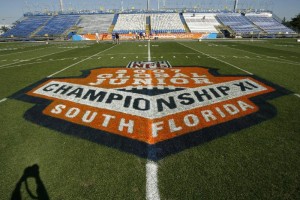 A return to Lockhart Stadium in Fort Lauderdale in 2007 saw the GJC increase in numbers, welcoming a sixth team as Panama made a welcome return. Canada lifted its third straight championship with a 23-13 victory over a USA team featuring players from Miami-Dade and Broward counties. Quarterback Bruno Prud’Homme ran and threw for a touchdown as new Canada head coach Glen Constantin announced his reign with a victory.
A return to Lockhart Stadium in Fort Lauderdale in 2007 saw the GJC increase in numbers, welcoming a sixth team as Panama made a welcome return. Canada lifted its third straight championship with a 23-13 victory over a USA team featuring players from Miami-Dade and Broward counties. Quarterback Bruno Prud’Homme ran and threw for a touchdown as new Canada head coach Glen Constantin announced his reign with a victory.
Mexico reclaimed third place with a 25-17 comeback win over Japan, having trailed 14-0 in the first quarter. Panama finished fifth overall with its first GJC triumph in five attempts by outlasting France 14-6. The tournament welcomed some famous names among its onlookers as former Dallas Cowboys all-pro running back Emmitt Smith and NFL Defensive Player of the Year Jason Taylor took in the action.
The NFL Global Junior Championship did not return for a twelfth year in 2008. The International Federation of American Football (IFAF) announced its inaugural Junior (under 19) World Championship would be played in the summer of 2009 and that the nations that annually competed in the GJC would instead be required to focus on the new event, to be held every four years.
“Wonderful memories, amazing friendships, very special opportunities for young players and their dedicated coaches,” added Steenberge. “This was one of those ideas I am very proud to have conceived.”

